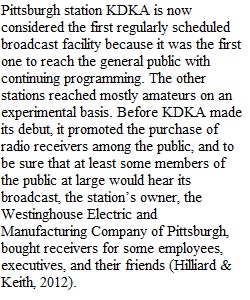


Q Week 3 Assignment Your assignment for this week is to answer the following questions as they relate to your readings for the week. Please send me your answers via the designated link (located directly under this post within this "Assignment" section of Blackboard) by Saturday by 6:00PM. HILLIARD AND KEITH Chapter 2: The Roaring 20s: Promise, Chaos, & Controls Please answer all of the following questions in each group. NOTE: the ?s are grouped by year in order to make it easier for you to reference. Group 1 1) Why is Pittsburgh station KDKA now considered the first regularly scheduled broadcast facility? --What did KDKA do to ensure they d reach an audience? 2) What did broadcasting companies do to monopolize control over radio s development? 3) In order to determine who was listening-in, what did KDKA radio announcer Frank Conrad do? 4) What kinds of programs (and how) were radio shows broadcast? 5) What function did radio serve during the post-WWI roaring 20s? 6) Who received the first radio broadcast license? Group 2 7) What provided the greatest impetus for radio sales? 8) Briefly describe David Sarnoff s contributions to the development of American broadcasting. 9) What were some of the costs of purchasing radio sets in 1921? 10) What kind of sounds were used on the first broadcasts & why? 11) Who were among the 1st talents to be on radio in 1921? -in 1922, what were some of the problems related to radio performers / talent? 12) What were the first radio broadcast advertisements promoting in 1922? Group 3 13) What was Secretary of Commerce Herbert Hoover s expressed concerns/ sentiments regarding radio broadcasting & advertising? 14) Like today, who were the key players in determining the outcome of radio technology? How has this limited the potential of radio? 15) What miracle of modern science occurred on June 11th, 1923 & how would this affect radio? 16) In 1923, what was the dominant programming on radio? 17) How was radio used for governmental politics after WWI? --How did the audio components of radio affect perception and reception of President Calvin Coolidge? 18) How did radio literally unify people in a national community through former President Woodrow Wilson s radio address? Group 4 19).Describe some of the problems that emerged from unregulated competition. 20) What were the objectives / outcomes of each of the National Radio Conferences? Who attended and why? 21) What impact did radio have on national elections in 1924? 22) What were some proposals for funding radio in 1924? Group 5 23) Why was there a license freeze in 1925? 24) How were other media industries affected by the advent of radio? 25) How was NBC formed in 1926? -describe the advent advertising on network programming. 26) What controls / responsibilities did the FRC have regarding radio broadcasting? 27) What were the 2 significant aspects of the Radio Act of 1927? -what were some of the outcomes of license renewals? 28) How were newspapers impacted by radio in 1927? Group 6 29) What occurrences between 1926-27 would forever impact radio? 30) Describe the socio-cultural climate in 1928? 31) What 2 types of radio drama made their debut in 1929? --describe some of the popular programs. 32) How did ratings evolve? 33) What was the Code of Ethics? Who proposed it and why? 34) How did radio survive the Great Depression?
View Related Questions